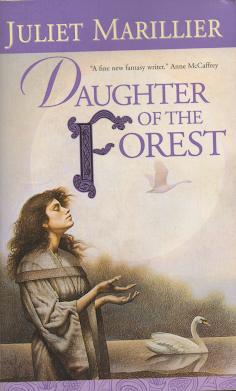First impressions review: Daughter of the Forest, by Juliet Marillier

Back in high school, I read quite a few books that could be classified as “1990s girlboss fantasy retelling”, such as the ‘Mists of Avalon’. Generally, they took some classic legend or fairytale and re-told it from the POV of one of the main female characters, such as Morgan LeFae or Maid Marion. I soon caught on that the feminism was usually kind of superficial, often involving the MC liking sex plus some generic “look how bad sexism was in medieval times” stuff. They could still be a good time, though, especially considering that back then smut, especially of the sex positive, female-focused sort, was harder to access! I kind of expected this book (which I remembered seeing at the time) to be a nostalgic throwback to that, though maybe with more plant lore and less spice than some. Boy, was I wrong! While I generally liked the writing style, and there were moments of both great natural beauty and good narrative tension, overall the pacing was weird,




